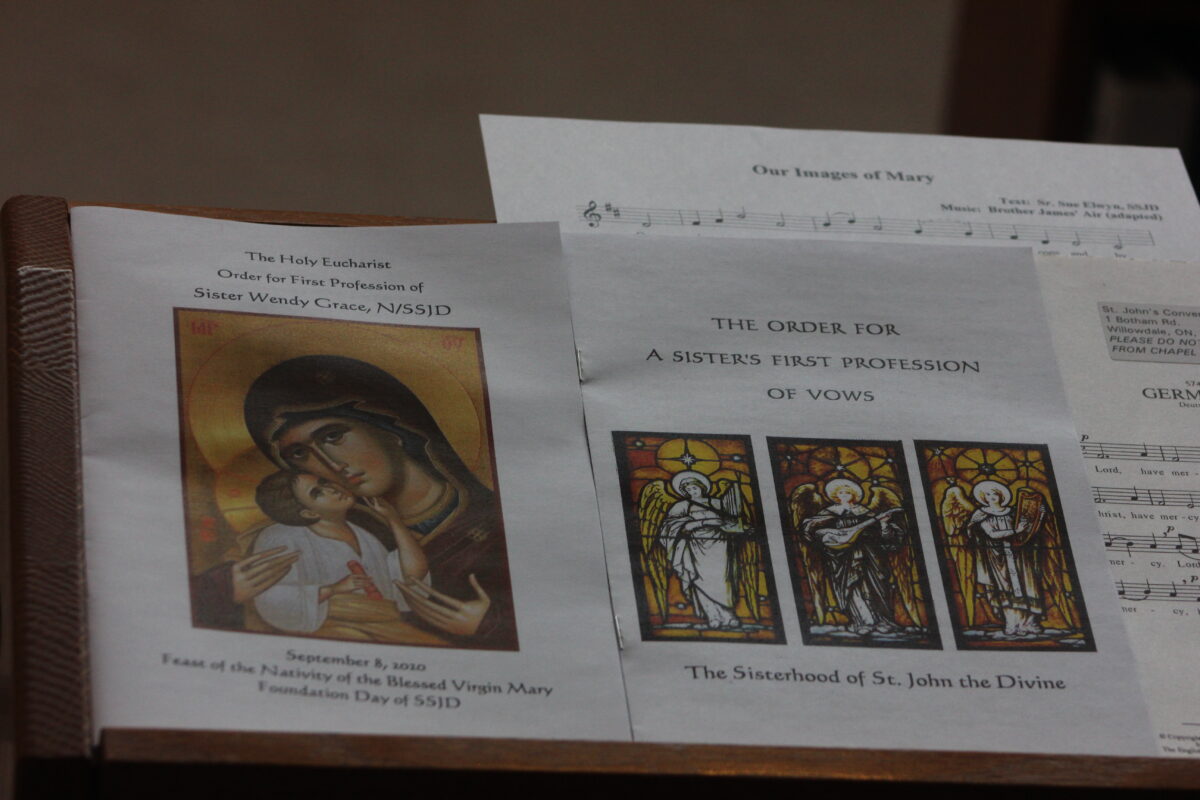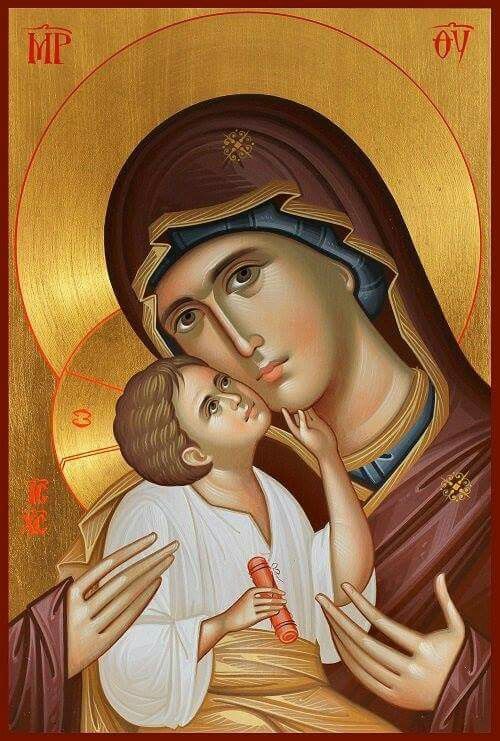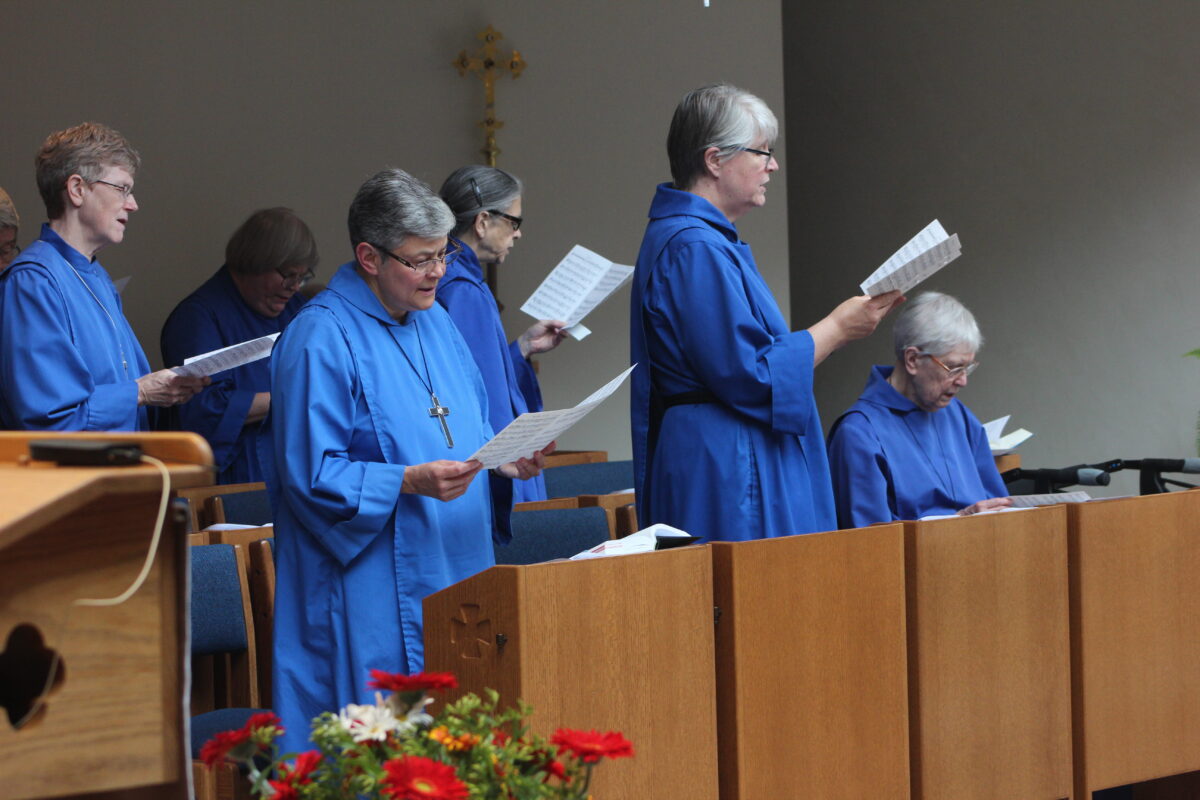By Sr. Sue, SSJD.
Readings: Isaiah 61.9-11; Psalm 66.16-18; Revelation 21.1-7; Luke 1.26-33
Let the words of my mouth and the meditation of all our hearts be acceptable to you, O God, our rock and our redeemer.
The Sisters have a long history of debate on whether to use the word “celebrate” or the word “keep” when we observe a saint’s day. In some instances, the reason for the debate is clear: we can easily “celebrate” the birth of John the Baptist, but surely it’s more appropriate to “keep” the memorial of his beheading; we want to “celebrate” the Feast of the Epiphany, but we don’t want to celebrate the Feast of the Holy Innocents – the memorial of the slaughter of young children is a day to “keep”, not “celebrate”.
Today, however, there is no question in my mind. We are celebrating. We are celebrating the Birth of the Blessed Virgin Mary, the Mother of our Lord and Saviour Jesus Christ. We are celebrating the day on which Hannah Grier Coome took her life vows and the Sisterhood of St. John the Divine came into being. And we are celebrating the first profession of our beloved Sister, Wendy Grace Greyling, as she takes another step in her journey towards God in SSJD. Yes – today we are celebrating!
There is so much I could preach on here: the Blessed Virgin Mary, the foundation and continuing life of our community, the act of first profession – so very much I could look at. When I first started to work on this homily, I thought first of the Virgin Mary, the mother of our Lord, of her birth and her life. When I went to the readings, however, I didn’t find much about Mary. I found a lot about new beginnings in Isaiah and in Revelation and in Luke; I found gratitude for prayers asked and answered in the psalm. But Mary only showed up in Luke, and only as the Theotokos – the God-bearer, not really as a person in her own right.
I’ve run into this – I tend to think of it as a problem, but it’s probably just a situation – I’ve run into this situation before. Where is the person? More than that, where is the woman? The Bible was written in a time when women were relatively unimportant in themselves. For that matter, men were relatively unimportant in themselves. People were seen, and saw themselves, as part of something: part of a family, part of a clan, part of a nation; part of a business, part of a community – a village or a town or a city –, part of a religion. The idea of selfhood was limited and of importance only as that self contributed to the larger entity. The notion of individuality, the importance of individual being and consciousness and personhood which is so very important in our society would have been foreign to the people of Biblical times, whether we’re speaking of the times of Isaiah, or the Psalmist or Luke or of that John who received the Revelation.
So the Blessed Virgin Mary was important as the Mother of our Lord, rather than a person in her own right, her own being. When I say that, I want to make it clear that I’m speaking here of the people who wrote the Bible, not of God our Creator or of God’s Son our Saviour, or of the Holy Spirit. To God, the one-in-three, the three-in-one, all people are important in their own right, their own being, and all are beloved. But to human beings, and in particular the human beings who wrote the readings we have heard, Mary was important not for her own life and being, but for her relationship to Jesus.
If we go only by what we can learn about Mary from the New Testament, we don’t learn very much. Most of our “information” about Mary comes from later periods: from the Gospel of James, an apocryphal work of the mid-second century; a “Life of the Virgin” from the 7th century; other later works; and the vast collection of stories and legends that have accumulated in Western and Eastern Christianity since the actual life of Mary.
Why is this important? Well, partly to explain why we keep the feast of the Nativity of the Virgin Mary, if there’s no mention of her birth in the canonical Gospels. And partly to say that, however little information we have about a person, we human beings like to know more: if that “more” isn’t available in our historical records, then we tend to make it up. The stories about Mary probably started in the first century, well before they were collected by the author of the Gospel of James. Whether the stories are considered theology or superstition depends, frankly, on who wrote them down. If they were written down by a high-ranking churchman or theologian (usually if not always male), they are theology – another way of saying ‘we should believe this’. If they were made up by a lay-person, maybe even a woman, they are generally considered superstition, and not worth bothering with.
So – I’ve spoken a bit about Mary, a bit about what little we know, or has been made up, about her life. What do we do with all this? Especially those of us here, those of us who are surrounded by a culture which seems to value the individual above all else? Some of us entered SSJD before the cult of the individual became quite so strong, but many of us have entered since it became so prominent. What can we learn from Mary, from her life (what we know of it), from her birth (what we may believe about it) and above all from her relative anonymity?
I believe that being a person is important. I believe that being a Godly person is important. I believe that attempting to act and live according to our truest self is not only important, but a Godly act, an act pleasing to God.
I also believe that all people, all persons, are part of larger entities: as I said above, families, clans, nations, businesses, communities, religions. We all belong to more than one of these entities: for myself, I am a daughter and sister in the Elwyn family, a cousin to Elwyns and Popkins and Leacocks, a citizen of both the US, my birth country, and Canada, the country of my heart. I am a member of the Christian religion, a member of the Anglican church, and above all, a member of the Sisterhood of St. John the Divine. How do I balance the needs of my Sisterhood, and of my Sisters, with my own needs? When do I put the Sisterhood first, and when do I put myself first? Is there a way for me to live where my own needs and the needs of the community become one? All of us have similar patterns of belonging. All of us have similar issues in balancing the needs and desires of our individual selves with the needs and desires of our families and our nations and our Sisterhood.
Even Mary, I think, must have had such struggles. Some people put her on so high a pedestal that she can have no faults, no problems, no issues, but to my mind that strips her of a humanity that is of enormous importance, a humanity that made possible the Incarnation, and it is around that humanity that I want to weave my own stories about Mary. Did she ever feel like taking Jesus and shaking him until he realized he’d behaved badly – and how badly he’d behaved? Of course she did. We have that story from Luke, when he’d stayed behind at the Temple, lost to his parents for three days, at the advanced age of 13. Did she ever have days when she just wanted Joseph and Jesus and all the other children to just disappear and let her get on with the weekly laundry? I certainly hope so – it brings her humanity closer, more evident. Did she have days when she thought her beloved son was out of his tree, roaming around the country making a spectacle of himself? We know that as well, from Matthew, and Mark and Luke.
And what of us? Do we ever have days when we wish our beloved Community would just go jump in a lake somewhere and leave us alone? Are there times when we just don’t want to volunteer to fill in after supper, or take another sister to a doctor’s appointment, or let go our own work to attend yet another meeting? Do we have days when anger erupts and does so righteously and rightly? Do we have days when we are so tired that being polite at community time seems a torment and a torture? Do we have days when we know we ought to speak out and fear holds us back? Of course we do. We all do. And if you don’t have these days, then you have your own days of temptation, when getting your own way seems more important than what your Sisters are saying or needing.
Sometimes, it’s actually important, and Godly, to be angry and to say so. Sometimes it’s foolish and unGodly not to be afraid. Sometimes, we need to put aside our own tiredness and volunteer one more time. Sometimes, we need to recognize that we are too tired and we need to resist the temptation to volunteer and instead look after ourselves. Sometimes we need to find the courage to make ourselves heard and sometimes we need to find the patience to listen to others.
I have spoken of balance between self and community, between the smaller individual and the larger entity which gives us life and purpose even as it requires our life and dedication. And balance can seem a static thing: a see-saw at balance is without movement, as is a perfectly balanced scale. But a pendulum at balance is constantly moving, and I think that human beings are more like pendulums than like see-saws or scales. We need to be in movement, physically, emotionally, spiritually, or we lose what makes us human; a completely static human being is a dead body.
So – where am I going with this? And what does it have to do with the Foundation Day of our Community, and with the First-profession of Wendy Grace? Our Community was founded by human beings, ordinary women, however dedicated in their hearts, on the Nativity of the Blessed Virgin Mary, another human being – perhaps not ordinary, but certainly human. And our Community continues to exist because of ordinary women who have the courage to follow a call, to dedicate themselves in hearts and minds and souls, to join us in living a life of prayer and service: women who are willing to look for that constantly moving balance between self and community, between ego and God.
It’s not easy to live a life of such balance, sometimes. Sometimes it’s not so hard, though. And one thing I can assure you – it’s never perfect. We never do a perfect job of balancing, of being just angry enough or just brave enough or just self-sacrificing enough. We never do a perfect job of looking after ourselves or looking after our Sisters or looking after our Sisterhood. Awareness helps – awareness of the old demons that drive us, the new angels that support us, the effects of too little sleep or too much. Awareness helps, but we can never be perfectly aware either. All we can do is continue to try, to continue to seek God within and without, and like Mary and Mother Hannah and all the professed sisters who came after Mother Hannah, and like Wendy Grace as she takes her place among those professed sisters, know that we are doing the best we can: not a perfect job, but a Godly one.
Thanks be to God.





